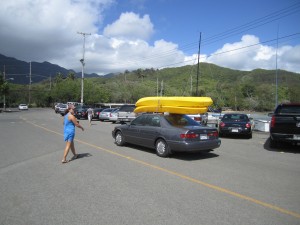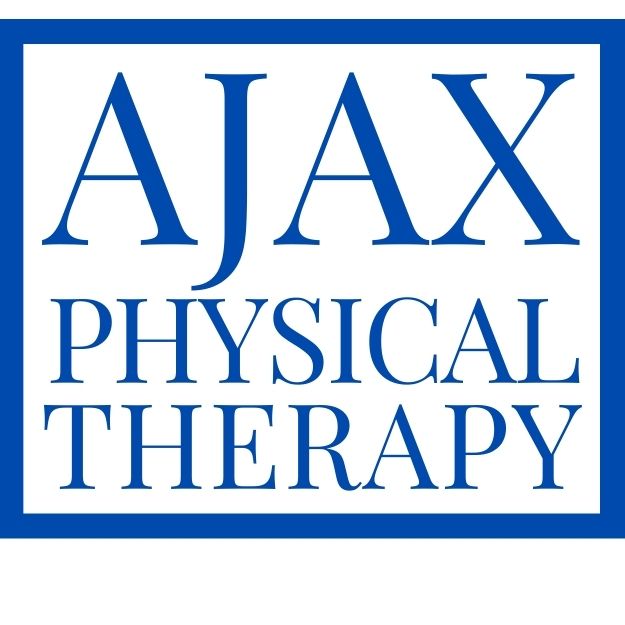I find myself on long road trips at least twice a year. I work my winters in Colorado to be close to the mountains and, more importantly, to be on my skis as much as possible. In the summer, if possible, I like to find an assignment by the ocean. The trek from Colorado to open ocean is a long drive. I’m from Boston originally, so I’m frequently headed back to the Northeast. I love the adventure of long road trips, but they can really wear you down.
Here are some things you can do to make the trip more healthy, comfortable, and, most importantly, fun. There’s nothing better than enjoying the ride and pulling into port relaxed and ready to hit the ground running.
Eat Right.
This is by far the best thing you can do to make yourself feel better over the course of a long road trip. If you truly make the effort to eat healthy along the way, you’ll hit your destination feeling better all over. On my first few major road trips, I fell victim to greasy highway food, fried snacks, energy drinks, and beef jerky. OK, I still fall victim to beef jerky, but if I keep the other temptations in check, a little dried meat won’t hurt – it’s become a road trip ritual! A hallmark of my early travel career was pulling into the next assignment with an upset stomach and feeling really greasy. Eating right is by far the most important thing you can do to feel normal when you arrive at your next assignment.
Order the Salad
Most highway rest areas are going to have a place you can order a salad. If you can’t find a salad, there’s usually some sort of healthy wrap option. Granted, you’ll occasionally find awful stops without any salad, wraps, or even those woeful gas station fruit cups, but if you order a salad every time it’s available to you, you’ll feel better all over and experience less sugar-crash than eating easier and more tempting options.
Skip the Energy Drinks
It’s a road trip – you’re gonna need caffeine. But, please, please, PLEASE, skip the energy drinks. I’ve seen some strange things in highway truck stops, but few stranger than the 32 oz “BFC” by Monster Energy. Who knew such a thing needed to exist!? …that’s a lot of beverage. Energy drinks really take their wear on my stomach. An energy drink here and there may not be the worst thing, but over a several day road trip, your occasional energy drink can easily become a 1-2 a day stomach-smashing habit. Energy drinks lead to all the “no’s” of road tripping: stomach upset, sugar crash, and a tough time sleeping when you need to. Stick to tea or even coffee. I know coffee can wear down your innards as well, but not like that carbonated stuff will. There’s some great widely-available iced teas out there that are made with minimal added sugar and with an actual brewed-tea base, stock up on a few of those for the ride for when you need a little bump.
Seek out the Continental
Continental Breakfasts aren’t known for their nutrient value, but it’s free. If you have a free breakfast available to you that may have some fresh fruit, yogurt, or bagels, this is a much better option than popping into the quick mart at the gas station just before the highway. Given two hotels of similar price and quality, go for the one with breakfast included. It’s the most important meal of the day, and I’m convinced that one of these days I’ll figure out how to correctly use the make-it-yourself waffle machine.
Make Time for Meals, Real Meals
Time management will become a theme here. My first Boston to Colorado road trip was in college during the summer of 2004. Two buddies and I took turns sleeping in the backseat of my parents’ car (after mine broke down less than 20 miles into the trip) while the driver pounded Mountain Dew and Dr Pepper until he physically couldn’t drive anymore. We made the non-stop trip to Colorado Springs in under 36 hours. We were toast at the end of that trip. Of course, at the time, I thought it would be a once in a lifetime trip. It turns out he three of us would repeat the trip two summers later on the way to west coast clinical affiliations. This time, we brought 3 more friends with us and made the full trip from Boston to Huntington Beach, California – Coast-to-coast. We stretched it out and took 3 weeks to enjoy the journey (more on this later). After many, many more cross-country road trips, I have learned to build in time for things that matter.
Take time, every day, to eat one real sit-down meal. It’ll take 45 minutes to an hour extra, but you’ll feel better nourished because of it and ready for the next leg of the trip. Also, if it’s a decent option, Order the Salad.
Pack Some Snacks
Throw some carrot sticks in a zip lock, bring along a container of cashews, throw in a couple pieces of fruit you like. It took me a lot of road trips to figure out this simple thing: if you bring your food with you, you’ll rely less on service station food. Fortunately, there’s usually some food left over at the end of an assignment. I’ll pack what I can for snacks out of the stuff left in the fridge and stop by the grocery store the night before I leave for a few extra healthy foods. When you’re sitting around all day (driving), it’s natural to want to snack to occupy yourself – better a healthy snack than a bag of Fritos.
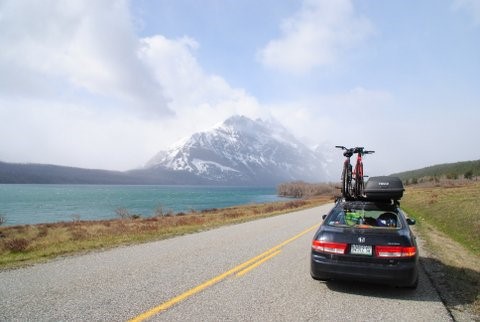
Our loaded car on a brief side trip to Glacier National Park. We arrived in the off season and had the park totally to ourselves. The national parks always make awesome side-trips.
Enjoy the Journey
It’s a really hard thing to do, but set a couple extra days aside so you can enjoy the ride. Afterall, “it’s about the journey, not the destination.” Fortunately in the case of travelers, the destination is also part of a larger journey, but I digress. Bottom line, take your time, build in side trips, and enjoy these road trips that can either be a hell bent charge to reach the end, or they can be some of the coolest memories of your life.
Root, root, root for the away team
One thing I love to do on long trips is to catch a road game. It’s a lot of fun to go cheer for your home team as the visitors. Check out your team’s schedule ahead of time and see if there’s somewhere you might be able to catch them while you’re both on the road. If you can’t catch your own team, just find a game that interests you, it’s cool to see different stadiums and it really breaks up the trip.
Side Trips
“If you aren’t taking side trips, you are not on a road trip. You are only driving.” -I just made that quote up, but I like it.
There’s the quirky roadside attractions: The Corn Palace, a 30ft Van Gogh, World’s Largest Ball of Yarn. There’s winery and brewery tours – better done AFTER a day of driving. And there’s the endless list of museums and halls of fame. My list of must make stops if you’re driving near them includes: Lincoln’s Tomb (Springfield, IL), Graceland (Memphis, TN), Baseball Hall of Fame (Cooperstown, NY), The Bourbon Trail (Kentucky), and add a day for any major national park you drive by. Skip the Rock and Roll Hall of Fame, not worth it, sorry Cleveland. America has thousands of roadside attractions that are worth pulling off the highway for – check ’em out!
Exercise
You may have to get up a little earlier in the morning, but some light exercise will make a great impact on the way you feel sitting all day. I personally enjoy a few mile run in the morning, but many of the campgrounds and hotels I stay in are right by the interstate. The added excitement of cars bombing by in an area not known for runners is a little too much for me. My second choice for a workout is the dinky gym in the hotel with a single cable and a stationary bike – enough to get the job done. However, frequently, my best choice is about 30 minutes of room-based exercise.
When I’m doing my in-room workout, I focus on hitting every body part to get the blood flowing, and I like to throw in a few postural exercises. When I say postural, I mean working the upper back and core and stretching out the chest – skip the push-ups, they are over-rated and will tighten your pecs, encouraging you to hunch over the steering wheel for the rest of the day. Work that upper back and scapular muscles by laying on your stomach and raising straight arms in front of you, to the side, and behind in 3 sets of 10 for each position, this will hit a few different group of muscle in your upper back and between your shoulder blades. Stretching the front and working the back helps you pull your shoulders back and over time will promote better posture and mechanics for you. I like to throw a few leg exercises in as well – lunges and wall squats are my favorites in the hotel room. Work the core with some slow bridges (laying on your back with knees bent and lifting your hips off the floor while tightening your abs), and you’ve completed a basic, but good exercise program to get the day going. Now go crush that continental breakfast without guilt, and good luck with the make-it-yourself waffles.

The things you’ll see on a road trip…I spy a heard of buffalo out my window.
Use Your Resources
Apps (All mentioned are free apps available for iPhone and Android!)
OMG apps! There’s so many that can help you burn those miles of road with more ease.
A decent GPS app is a must. On my day to day I use Google Maps for navigation, but not on road trips! Waze (incidentally, now owned by Google), is a GPS app with some flare. Drivers live-time report road hazards as they drive. The app will alert you as you are approaching debris in the road, traffic and detours, or even the routine abandoned car in the breakdown lane. The alerts are handy and will help keep you safe. If I need to compare the time between a couple different routes or the time added by detouring to a different city, I use MapQuest. I find MapQuest to have the best options for adding and deleting stops to your trip and easily seeing the difference in trip length.
Beyond the generic GPS to get from point A to point B, there’s thousands of apps that specialize in finding particular services. I mentioned Urban Spoon already for finding food. That’s just my personal favorite, there’s other out there that will do the same job just as well. For finding hotels I use the Hotels.com app to book low prices, but the TripAdvisor app to look up hotel reviews. I also use TripAdvisor for reviews of road side attractions to see if they might be worth stopping. GasBuddy is an app that displays gas station prices including information on when a user last updated the price. GasBuddy helps prevent showing up at closed stations with an empty tank and helps find the cheapest gas every time. I’ve found a couple apps out there for RV users and even for tent camping to review and book campsites – Good Sam is a very popular service and app for RVers.
Grab a Buddy
With a little bit of planning, you can work a lot of friends into a single road trip.
If you’re lucky enough to know someone who needs to go in the same direction as you, it’s fantastic to have a co-pilot (to operate all those apps for you). The right friends will even fly-in to enjoy a segment of your road trip with you. I once had a friend fly in to enjoy a weekend in Vegas mid-road trip – what a weekend! There’s a lot you learn about yourself while alone on the open road, but having some company makes the miles fall away much easier.
Couch Surf
I stay with friends whenever I can. On a road trip last fall (of course, from Boston to Colorado), I was able to stay just one night in a hotel on a three night trip. Night number two I spent with friends in Chicago – we went out for dinner and enjoyed catching up. I then woke early the next morning and put the pedal to the metal to make a house party in Denver the next night – way too much driving for one day. But, visiting, eating, and partying with friends made the miles seem less like a chore and made the whole trip feel more like a vacation. I would gladly drive two hours out of my way to crash with a friend rather than stay in a musty hotel room. Think of your next trip and get on the horn to see who you can crash with.
Buy Local
Buying local is one thing you can do while passing through a place to do a little good while you’re there. Your money will do it’s part to help the local economy. Also, from an environmental standpoint, if you’re buying local, less goods are having to be shipped places using less gas to get them there. We’re already burning enough gas zipping back and forth across the country with overloaded cars, no need for everything we buy to do the same.
Eat and Drink Local.
To back up for just one moment to the eating well topic, some of my best road meals have been at local, small town bars and breweries. Small breweries have tasty beers you can’t get anywhere else and usually have great food, even in the most unlikely places. By blindly following my Urban Spoon app to tasty food I’ve discovered killer small town dives and explored cities I otherwise would have zipped right past. At local restaurants and pubs, you’re getting a meal, an experience, and doing the local economy just a little bit of good.
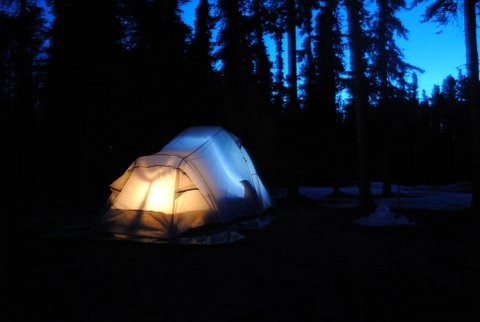
Camping did not make the list, but it’s definitely worth a mention. When the weather’s right, it’s a great way to save money, meet a couple characters along the drive, and enjoy some of the great outdoors on scenic back roads.
DIY Local.
Enough road tripping and you’ll need a wind shield wiper, a headlight bulb, a quart of oil, or a new axle (different story for a different time). Try to use local mom-and-pop shops. Avoid the huge box stores. Keep the good people of Anywheresville employed by their fellow neighbors who are all helping to sustain their own community.
Finally, ENJOY!
Road trips should not be a chore. Enjoy your time out there on the road. The highways of America have a lot to offer in unique experiences and sights. Grab a buddy and a tank of gas, and go see everything you can!
—
This piece was written in collaboration with Fusion Medical Staffing and originally appeared on their site at:
Getting There: Staying Healthy, Having Fun, and Enjoying the Ride


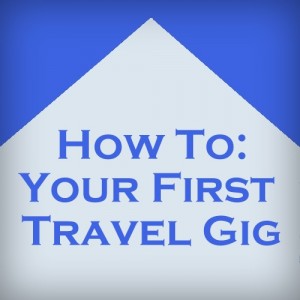 After being a traveling PT for 8 years, I sometimes forget that what now seems like a pretty routine process was very intimidating and complicated at first. This post describes what you can expect in the process of getting your first traveling therapy job. I have another page that you can link to under the “
After being a traveling PT for 8 years, I sometimes forget that what now seems like a pretty routine process was very intimidating and complicated at first. This post describes what you can expect in the process of getting your first traveling therapy job. I have another page that you can link to under the “



 I’ve been getting the same type of question from new traveling Physical Therapists a lot lately…. so let’s hash it out in public. The question goes something like this: “I want to travel, I know where I want to go, but where do I start?”
I’ve been getting the same type of question from new traveling Physical Therapists a lot lately…. so let’s hash it out in public. The question goes something like this: “I want to travel, I know where I want to go, but where do I start?”


